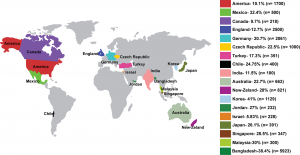Most evolutionists believe that humans evolved from ape-like ancestors that had larger jaws and teeth than humans. The story holds that our jaws became smaller over millions of years as we “progressed,” trading our crunching power for brain power, resulting in the present challenge for wisdom teeth to grow in. However, studies over the last few decades have shown that the “evolutionary process” is actually not the best explanation for why many people groups have challenges with their wisdom teeth growing in. Decades of research into this area has now identified a more complicated (and less “evolutionary”) explanation:
Our better understanding of the complex teeth-jaw relationship has revealed this explanation is far too simplistic. Research now indicates that the reasons for most third molar problems today are not due to evolutionary changes but other reasons. These reasons include a change from a course abrasive diet to a soft western diet, lack of proper dental care, and genetic factors possibly including mutations. Common past dental practice was a tendency to routinely remove wisdom teeth. Recent empirical research has concluded that this practice is unwise. Third molars in general should be left alone unless a problem develops and then they should be treated as any other teeth. At times removal is required, but appropriate efforts to deal with problem teeth should be implemented before resorting to their extraction.
An Oxford Medical publication by A. J. MacGregor summarizes 20 years of research on this very topic in a work titled, “The Impacted Lower Wisdom Tooth.” MacGregor states:
Evidence derived from paleontology, anthropology, and experiment indicates very convincingly that a reduction in jaw size has occurred due to civilization. The main associated factor appears to be the virtual absence of inter proximal attrition, but initial tooth size may have some effect. Jaw size and dental attrition are related and they have both decreased with modern diet. Jaws were thought to be reduced in size in the course of evolution but close examination reveals that within the species Homo sapiens, this may not have occurred. What was thought to be a good example of evolution in progress has been shown to be better explained otherwise. [emphasis added]
These developments have led to a better understanding of wisdom teeth that have changed the practice of dentistry. In fact, in an article titled, “The Prophylactic Extraction of Third Molars: A Public Health Hazard,” Dr. Jay W. Friedman points out that wisdom tooth extraction (a $3 billion-dollar enterprise) should not be the default practice for most individuals, but should be only done on a case-by-case basis. Dr. Friedman argues: “… more than 11 million patient days of ‘standard discomfort or disability’—pain, swelling, bruising, and malaise—result postoperatively, and more than 11,000 people suffer permanent paresthesia—numbness of the lip, tongue, and cheek—as a consequence of nerve injury during the surgery. At least two thirds of these extractions, associated costs, and injuries are unnecessary, constituting a silent epidemic of iatrogenic injury that afflicts tens of thousands of people with lifelong discomfort and disability.” He concludes by stating, “Avoidance of prophylactic extraction of third molars can prevent this public health hazard.” For many of the same reasons, the UK even stopped routinely removing wisdom teeth (without solid evidence of required removal) in 1998, after a study at the University of York concluded that there was no scientific evidence to support it.
People groups vary by a number of factors: skin color, hair color and type, eye shape, body size and shapes, and yes, even wisdom teeth. In fact, some people groups (e.g., Mexican Indians) don’t even typically erupt wisdom teeth! On the other hand, nearly 100% of indigenous Tasmanians fully grow in their wisdom teeth. Other people groups are in-between these two extremes (see Figure 1).

Figure 1. Global distribution of prevalence of third molar Agenesis (not growing wisdom teeth).
Figure 1 shows a wide variability between various people groups with respect to the percentage of people who don’t grow in their wisdom teeth. One study with 2,482 people also revealed that different people groups even grow in their wisdom teeth at different stages of maturity, with the German population in the middle in terms of the age of wisdom tooth eruption, South Africans the fastest, and Japanese the slowest.
Are some of these people groups more or less “evolved” than others? From a Biblical Creation standpoint, certainly not! They do, however, vary on dietary history, industrialization, food types and production methods (especially in the past), and other characteristics by which people groups sometimes vary.
Orthodontist John Cuozzo has studied this topic extensively in both “modern” humans and Neanderthal fossils. Because Neanderthals had larger brains and jaws than humans (by 10% and 15%, they had plenty of space for their wisdom teeth. Because evolutionists place Neanderthals in the distant lineage of “modern” humans, have humans been “devolving” (by having smaller brains and less room for growing wisdom teeth), or just changing within the pre-engineered adaptability designed by God.
Dr. Cuozzo studies have led to the discovery that children are maturing much faster today than in the past: “… three or four hundred years ago a child took 13 years to reach the stage that our children today do in 9 1/2 to 10 years. This points to a rapid maturation today.” Dr. Cuozzo reasons that wisdom teeth need more space than can develop in our shortened jaw growth period, and that children are taller (and mature earlier) today because of improved early nutrition—not evolution. His research has led him to the reasonable conclusion: “This is not from a process of evolution, but devolution… The de-generation and reduction of complexity of the human body is what is really happening…This, of course, is due to the fact that Adam fell and we have been suffering and groaning under the curse resulting from this fall ever since.”


